




Guests from around the world were invited to explore Tianjin through six curated designed routes to learn about the city's history, culture and innovative development on Thursday, the final day of the 16th Annual Meeting of the New Champions of the World Economic Forum, or Summer Davos.
Three of these routes focus on technological advancements, including visits to the key national scientific facilities such as the Cell Ecology Haihe Laboratory and the Large-Scale Earthquake Engineering Simulation Research Facility, according to the organizing committee.

Guests also toured companies exemplifying the upgrading of traditional industries, such as Haier and Tianjin Rongcheng Iron And Steel Group. Additionally, visits were made to robotics companies and research institutions centered around artificial intelligence.
The other three routes covered cultural landmarks, offering horse-drawn carriage tours of the Five Great Avenues, visits to Haihe River cruises, Italian Style Town, and Tianjin Grand Theatre.
"This is the eighth time the Summer Davos has come to Tianjin," said Li Wenhai, vice-mayor of Tianjin, during a pre-event press conference. He explained that the tours were designed to showcase Tianjin's unique industrial structure and rich cultural heritage, providing a comprehensive view of the city's charm to the attendees.
"We warmly welcome dignitaries, international organizations, global business leaders, and media friends to gather in Tianjin, promote high-quality development, and create a better future together," he said.
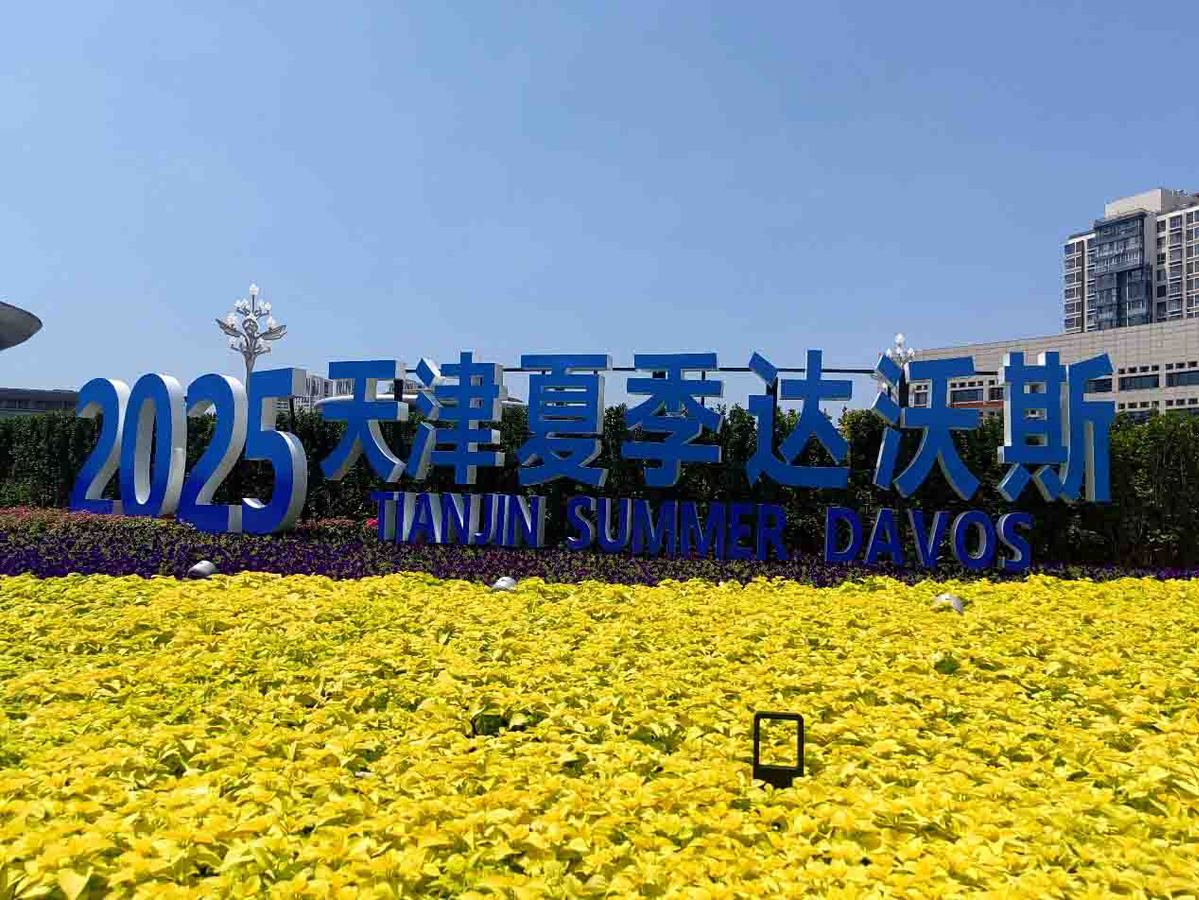
Mo Wenbo, a Chinese Singaporean who had previously worked in Tianjin, said, "The bridges over the Haihe River, like the Dagangming Bridge and Beian Bridge, beautifully blend Chinese and Western elements, making a lasting impression. The changes in Tianjin are astonishing - the city is more open, prosperous, and developed beyond imagination".
"This is my first time in China. Tianjin is stunning. The Five Great Avenues have preserved so many exquisite buildings so well, which reflects the respect Tianjin people have for history," said Martina Alvarado, a representative from Ecuador visiting China for the first time.
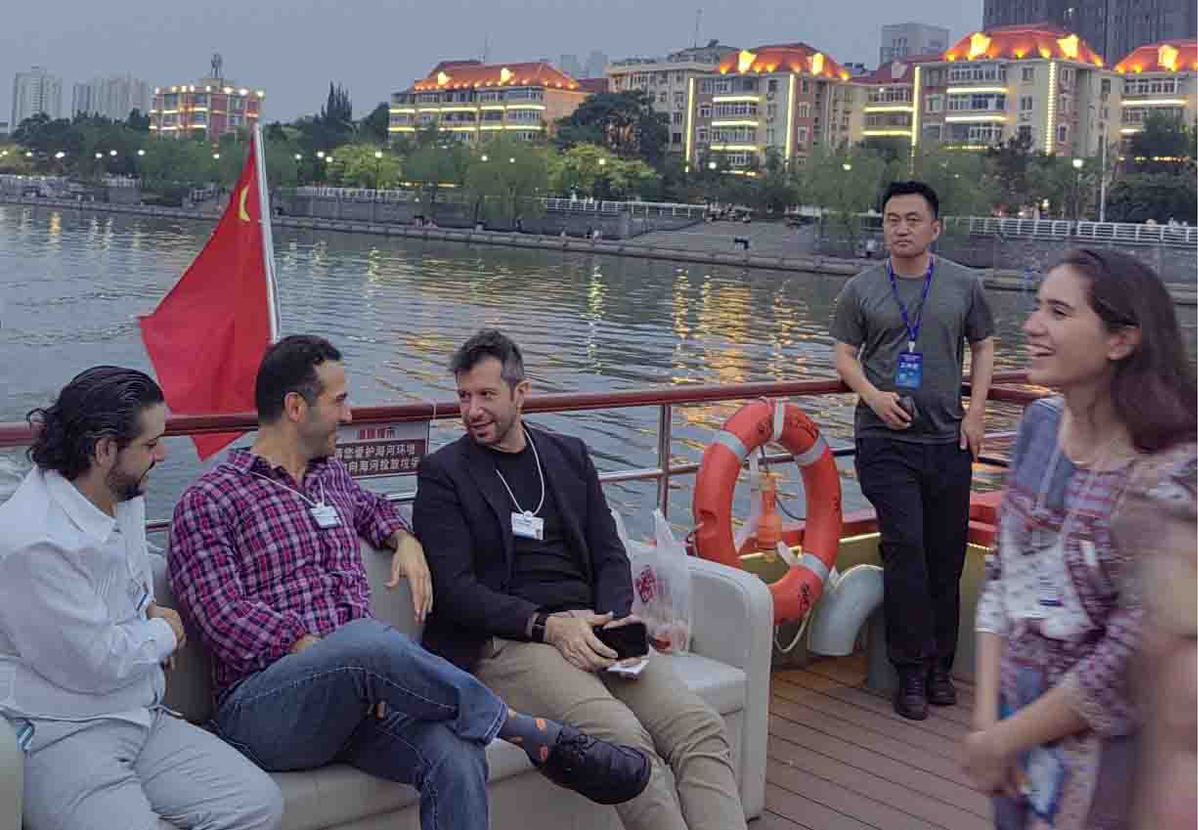
"Tianjin's hosting of the Summer Davos serves as a bridge for dialogue between the city and the world, and the six tour routes vividly showcase its charm," said Lu Ruotong, a student volunteer from Tianjin University.
"As the forum concludes, Tianjin — a city full of vitality and opportunities — will take this event as a catalyst to continue its path of open, inclusive and innovative development hand in hand with the world, creating more wonderful stories and painting a beautiful blueprint for high-quality development," she added.
Lu Ruotong contributed to this story.
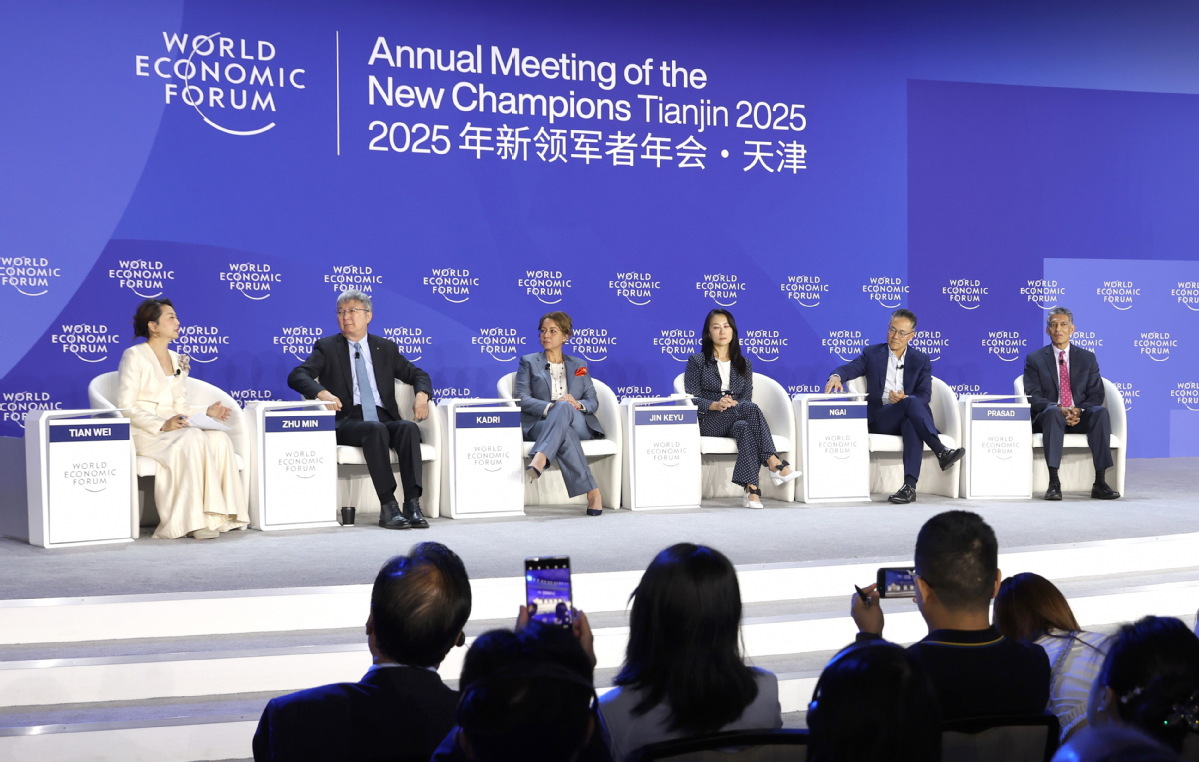
ISTANBUL -- Amid global economic headwinds and profound technological transformations, the Summer Davos Forum provides a platform for fostering dialogue on trade, innovation, and international cooperation, a Turkish expert has said.
The Summer Davos Forum, also known as the Annual Meeting of the New Champions, brings together global leaders, policymakers, and business experts to discuss pressing economic and technological challenges amid a shifting geopolitical landscape.
"When the global economy is under strain, concerns about trade wars and protectionist policies tend to increase," Selcuk Colakoglu, director of the Ankara-based Turkish Center for Asia-Pacific Studies, told Xinhua in an interview.
"In this context, the summer forum held in China offers an important opportunity to address key challenges facing global trade and cooperation," he said.
Colakoglu emphasized the importance of upholding free trade rules to maintain the stability of international business.
"Safeguarding free trade rules is essential to keep international business running as usual. Otherwise, more problems will arise from these issues," he said.
He commended China's continued support for trade liberalization and multilateral cooperation through mechanisms such as the World Trade Organization.
"The forum will be a crucial platform to facilitate cooperation among countries, business organizations and multinational companies," Colakoglu said.
The event, he added, will also highlight the ongoing transformation of China's economy.
"With the target of high-quality development, China is undergoing significant economic transformation," he said. "By strengthening its large domestic market, China also contributes to global economic momentum."
He added that both Chinese enterprises and international companies are encouraged to invest and participate in the domestic market.
As an expert in Asia-Pacific affairs who closely follows China's economic engagement with emerging markets, Colakoglu also underscored the forum's role in examining the transformative impact of emerging technologies, particularly artificial intelligence, on both developed and developing economies.
"There is a need to adapt to new technologies and reassess economic models globally," he said, noting that the forum provides an opportunity for international dialogue on these issues.
Looking ahead, Colakoglu expressed optimism that the forum will help global leaders navigate economic uncertainties and foster cooperation to build a more resilient and inclusive world economy.
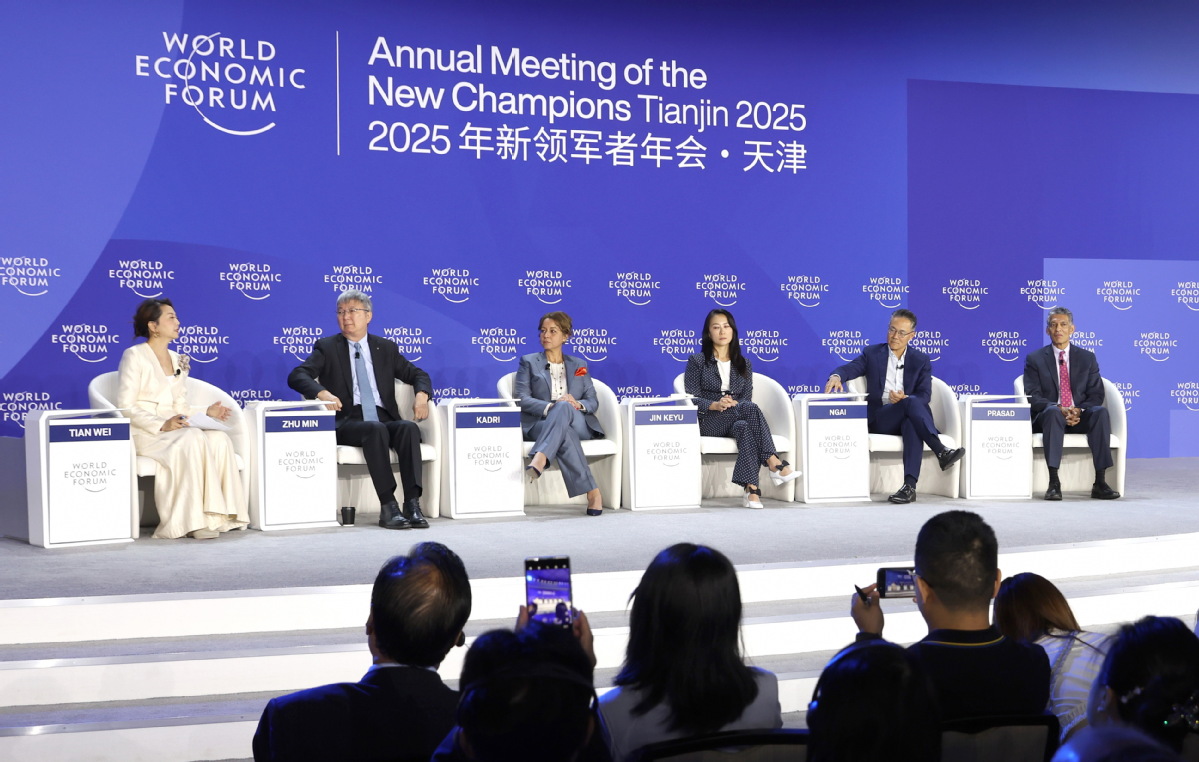
China's accelerating technological breakthroughs and efforts to stimulate domestic consumption are laying the foundation for sustainable economic growth as the country navigates global headwinds and transitions toward a high-income economy, experts and business leaders said on Wednesday.
Zhu Min, former deputy managing director of the International Monetary Fund, said China is entering a pivotal phase of innovation, underpinned by its large engineering talent pool and strong industrial foundation.
"With all the massive rich scenario China has in industry, in the next 24 months, I imagine we'll see a hundred DeepSeek-type software (products) emerge," Zhu said at a forum during the 16th Annual Meeting of the New Champions, also known as the Summer Davos, in Tianjin on Wednesday, referring to China's recent homegrown AI breakthroughs.
"'AI plus' is coming in a big way. It will have a huge impact on the whole economy."
Jin Keyu, professor of finance at Hong Kong University of Science and Technology, echoed this sentiment, saying China's unique combination of advanced technology and large-scale manufacturing enables it to lead in "scale-based, cost-reductive, leading-edge innovation".
"Even if the US could be the leader in inventions and breakthroughs, production and diffusion of technology is just as, if not more, important for the benefit of the economy," Jin said, adding that with AI now being pushed into "every plausible sector "through China's "AI plus" program, "this is kind of awe-inspiring".
Yet she warned that innovation alone cannot propel China to prosperity. "China is never going to be a rich country unless it becomes a big consumer country," she said, pointing to rising opportunities in second and third-tier cities where talent and services are rapidly expanding.
Joe Ngai, chairman of McKinsey China, said Chinese consumers are adapting with agility to economic shifts. "Chinese consumers are very savvy. They are trading for the same quality, for a lower price. They are not sacrificing quality," Ngai said.
He emphasized that value-for-money consumption is rising, not declining.
"They're very savvy customers …the value-for-money segment has been growing and that growth is very, very inspiring."
Despite challenges ahead, experts remain broadly optimistic about China's 2025 growth outlook.
"I'm relatively confident that China will likely hit its around 5 percent growth target this year," said Liu Qiao, dean of Peking University's Guanghua School of Management.
Liu cited the resilience in consumption and China's ample wiggle room for fiscal expansion, saying targeted fiscal tools such as special treasury bonds or modestly expanded deficits could counter uncertainties and spur demand.
From a financial perspective, optimism is also returning. "More and more investors are gaining confidence in China markets, both A-share and H-share markets," said Thomas Fang, head of China global markets at UBS.
Fang said the policy pivot since September has reassured markets. "They have this 'whatever it takes' policy … if it's not enough, they will add more," he said. "We want to see how the property downturn plays out and whether investor confidence continues to improve. It is a journey, but we are confident the policymakers have their fingers on the pulse."
Zhang Xiaoyan, associate dean at Tsinghua University's PBC School of Finance, pointed to recent homegrown AI breakthroughs like Deep-Seek as proof of China's innovation capacity. "The whole country is trying hard to boost the innovation environment."
Rapidly evolving artificial intelligence technologies are being applied to a wider range of sectors and have become a vital force bolstering China's economic development, as the country recognizes AI as an essential tool in fostering new quality productive forces and activating new growth drivers, entrepreneurs and experts said on Thursday.
China is at the forefront of AI application globally, which is not only playing a pivotal role in boosting its productivity, but is also driving the transformation and upgrading of its traditional industries, they said.
The entrepreneurs and experts made the remarks during the World Economic Forum's Annual Meeting of the New Champions, also known as the Summer Davos, which was held in Tianjin from Tuesday to Thursday.
Artificial intelligence, which is already reshaping the industrial landscape, is expected to be the biggest technological revolution in the next 50 years, said Zhou Yunjie, chairman and CEO of Chinese home appliance giant Haier Group.
"Currently, the deployment of AI in enterprises mainly concentrates on manufacturing, research and development, sales, procurement and services," he said.
Every industry will integrate with AI, and any enterprise that does not embrace AI will eventually be weeded out, Zhou said, adding that his company has invested heavily in developing large language models and is promoting the adoption of AI across various fields, such as household appliances and industrial internet.
Zhu Min, former deputy managing director of the International Monetary Fund, said that China will make significant progress in the use of AI technologies in the next 18 months to two years, highlighting that the country's vast consumer market of 1.4 billion people and abundant industrial application scenarios present unique advantages for the development of AI.
China has surpassed the United States in the number of academic papers issued on artificial intelligence, taking the top spot worldwide, Zhu noted, adding that such papers increasingly focus on the specific industrial applications of AI.
This year's Government Work Report stated that China, under its "AI Plus" initiative, will work to effectively combine digital technologies with its manufacturing and market strengths, support the extensive application of large-scale AI models, and vigorously develop new-generation intelligent terminals and smart manufacturing equipment.
Samantha Zhu, chairperson of Accenture Greater China, said it is clear that China is emerging as an innovation-driven economy, with its breakthroughs in areas such as AI and robotics highlighting its growing capability in critical technologies that underpin long-term competitiveness.
"The recent wave of AI innovation, led by open-sourced large language models, is so encouraging that companies are quickly mobilizing themselves to harness such technologies," she said.
The entrepreneur noted that there is a strong momentum of AI-driven transformation, with businesses quickly integrating AI into decision-making, operations and customer engagement. "Looking at the vibrant AI ecosystem, we can say that China is not just an AI market — it's a proving ground for AI adoption by enterprises at scale," she said.
According to market research company CCID Consulting, the market scale of China's AI sector will reach 1.73 trillion yuan ($241 billion) by 2035, accounting for 30.6 percent of the global total.
Li Haitao, dean of the Cheung Kong Graduate School of Business, said that China boasts a large number of well-educated talent and AI professionals, improved digital infrastructure such as 5G and computing networks, and ever-increasing innovation capabilities, which will continue to drive its explosive growth in AI.
Li Dongsheng, founder and chairman of Chinese consumer electronics manufacturer TCL Technology Group Corp, said that China's breakthroughs in large language models, along with the meteoric rise of Chinese AI startup DeepSeek, have enabled it to rapidly catch up with the US in the AI domain, while surpassing most other developed economies in terms of AI application.
As AI is embedded into terminal devices, intelligent production lines and product R&D, this cutting-edge technology will significantly improve the production efficiency and competitiveness of China's high-tech manufacturing industry, he added.
fanfeifei@chinadaily.com.cn
"Summer Davos is very beneficial in connecting with what's happening in markets globally," said Jan Buesing, founder of Responsive Drip Irrigation, a US company focused on surface irrigation technology, in an interview with China Daily Website at the 2025 Summer Davos Forum.
"I see this (China) as a very open market that holds a lot of opportunities," she stated, adding that it's wonderful to see China's progressive attitude toward environmental regulations and sustainability. #amnc25 #GrowwithChina
Greater efforts are needed to bolster the transformation and upgrading of traditional industries, especially manufacturing, and develop strategic emerging sectors to build up new growth drivers amid rising trade protectionism, said entrepreneurs and experts at the 16th Annual Meeting of the New Champions, also known as the Summer Davos, in Tianjin.
Li Dongsheng, founder and chairman of Chinese consumer electronics maker TCL Technology Group Corp, said manufacturing is China's most competitive sector and a core advantage of the Chinese economy, as the nation has taken the lead in manufacturing across the globe.
Highlighting that globalization is an irreversible trend, Li said the company is stepping up efforts to boost export industry capacities, establish industrial chains in overseas markets, strengthen localized operations and bolster the development of local economies, so as to cope with changes in the global economic landscape.
He added that enterprises' localization strategies are predicated on serving the demands of local societies and cultivating local partners in supply chains, while bringing employment and tax revenues to local markets.
Li noted fast-developing artificial intelligence has a huge influence on the high-tech manufacturing as this cutting-edge technology has been increasingly applied into terminal devices, industrial production, and products' research and development.
The application of large language models will greatly enhance the efficiency and competitiveness of manufacturing enterprises, Li said, adding that he believes that AI technology will boost the development of China's high-tech manufacturing industry.
He also emphasized the significance of entrepreneurial spirit, which means being proactive, innovative and persistent, and full of passion and vitality, adding that this spirit has been forged during the past 40 years of reform and opening-up, and that China's economy will be underpinned by a large number of private enterprises that are creative, dynamic and resilient.
China ranked as the world's largest manufacturer for the 15th consecutive year in 2024, and its manufacturing output accounted for about 30 percent of the global total, according to the Ministry of Industry and Information Technology.
Peng Sen, president of the China Society of Economic Reform, said China's manufacturing industry has become a significant engine driving the growth of global manufacturing, while exports of Chinese manufacturing enterprises have transitioned to high value-added, technology and capital-intensive products.
"In the next five years, China's manufacturing sector is expected to account for 40 percent of the global total," Peng estimated, adding that the United States' export control measures on advanced AI chips and core software technologies to contain China's rise in the high-tech sector will accelerate Chinese enterprises' efforts to achieve technological breakthroughs. The move also harms the interests of US companies, he said.
He underscored the importance of cultivating strategic emerging industries and future-oriented industries, such as new-generation information technology, AI, new energy, new materials, biomedicine and quantum technology, to gain an edge in an increasingly competitive international scenario.
He also observed that an increasing number of companies have begun to pay attention to their supply chain layouts, and are formulating digitalization and diversification strategies, increasing their investments in emerging industries and adopting localized strategies to explore more new markets.
Liu Zongchang, rotating CEO of Foxconn Industrial Internet, said the company is intensifying efforts to drive technological innovation and leverage advanced AI technology to boost productivity and reduce costs in industrial production, adding the company's AI server business is expected to maintain growth momentum in the second half of the year.
China is Colombia's second most important trade partner, and the Chinese market presents numerous opportunities for Colombian products, said Oscar Felipe Rueda Plata, commercial counselor, Colombian Embassy in China, to China Daily Website during an interview at the World Economic Forum's 16th Annual Meeting of the New Champions 2025, commonly known as the Summer Davos Forum.
"We always see China as a very trusty, very good trade partner. We think its position in the world helps the (global) economy," he added.?
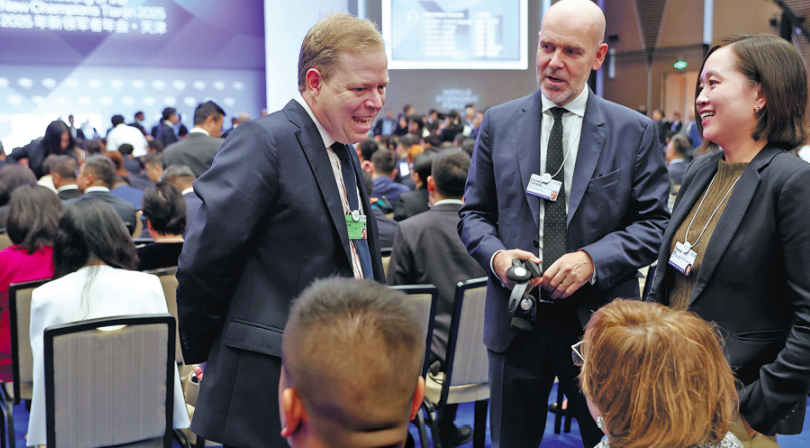
Business leaders and experts attending the 16th Annual Meeting of the New Champions — also known as the Summer Davos — in Tianjin on Wednesday hailed China's steady growth, advancing innovation and commitment to high-standard opening-up as key forces fueling global economic recovery.
Their remarks came as Premier Li Qiang delivered a keynote speech at the opening plenary session of the meeting, stating that China would continue to contribute its strength to global economic development.
Li also emphasized the country's commitment to fostering a market-oriented, law-based and internationalized business environment. He said China will continue to support entrepreneurs and warmly welcome foreign enterprises to invest in China, deepen their presence and grow together with China to build a better future.
Ni Ying, CEO of the Adecco Group China, expressed strong confidence in the Chinese economy. "The message about staying committed to innovation, expanding high-standard opening-up and promoting high-quality development is truly encouraging," Ni said. "China is our second-largest market globally. Its vibrant innovation ecosystem and rich talent pool give us great confidence."
Catherine Li, CEO of Marsh McLennan China, said Premier Li's address demonstrates China's global responsibility and leadership.
"Deepening our roots in China is not just a choice — it's an imperative," she said. "We are seeing China play an increasingly irreplaceable role in the world's high-end manufacturing sector. Its complete industrial system and rising share of global markets are unmatched, and it continues moving up the value chain."
Yin Kuo, chairman of Shenzhen Xiaokuo Technology Co Ltd, the company behind the popular oral care brand Canban, said long-term confidence in China's economic fundamentals remains strong despite short-term volatility.
"Looking at our infrastructure and the dividends of 30 years of development, we are very confident in China's economy and market," Yin said.
"Recently, we also feel consumer confidence is coming back. This is essentially a normal fluctuation period," Yin added. "In the long run, we have the world's best supply chain and some of the most hardworking and innovative entrepreneurs. The GDP continues to grow steadily, and in this environment, some short-term volatility is completely normal."
Looking ahead, executives and experts said China's reform drive and openness will continue to present long-term opportunities despite an increasingly competitive environment.
"It's a welcome sign that China's reforms and opening-up are continuing," said Ben Simpfendorfer, a partner at consultancy Oliver Wyman. "China has always been ambitious with its reforms, and that's a key reason it has achieved success both domestically and globally. I have strong confidence in China's capacity for innovation, which will be a major growth driver in the medium and long term," he said, adding "policymakers have shown they can make the right decisions to support emerging sectors, and I expect that will continue."
Huang Hanquan, head of the Chinese Academy of Macroeconomic Research, said: "China contributes about 30 percent to global economic growth, making it the largest contributor. China's development of new quality productive forces will inject fresh momentum into the global economy."
ouyangshijia@chinadaily.com.cn
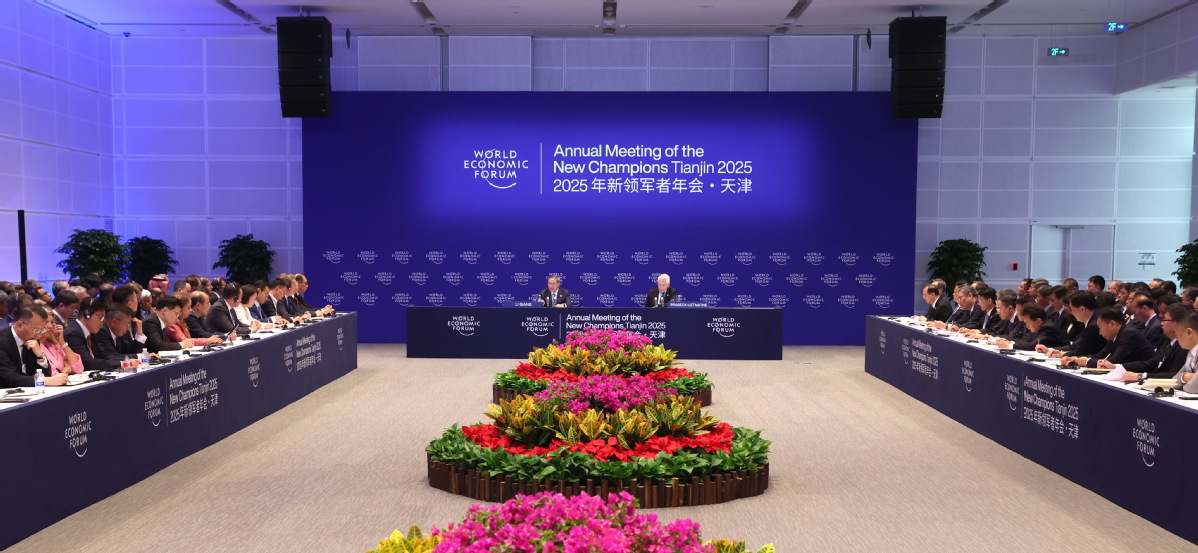
Premier Li Qiang said on Wednesday that in the face of global challenges, countries around the world should make the economic "pie" bigger through open and win-win cooperation rather than playing zero-sum games or following the law of the jungle.
Li made the remarks in an address delivered at the opening of the World Economic Forum's 16th Annual Meeting of the New Champions, also known as the Summer Davos, in Tianjin.
He said that the global economic and trade landscape is undergoing profound changes, driven by factors such as geopolitics, technological innovation and structural shifts.
Li called on the international community to take constructive actions in carrying out international economic and trade cooperation.
"Constructive actions mean we need to proactively take more practical measures to safeguard free trade and multilateralism and promote the stable development of the world economy," Li said.
Noting that it is normal for disputes and differences to arise in economic and trade exchanges among countries, the premier said that as long as countries engage in dialogue and consultation based on mutual respect, solutions can always be found.
"We need to strengthen macroeconomic policy coordination and ensure the stability and smooth functioning of global industrial and supply chains. Closer cooperation will help enhance the security and resilience of development for all countries," he added.
Saying that China is confident in and capable of maintaining rapid economic growth, Li expressed the country's commitment to do whatever it can to help tackle the difficulties and challenges facing the global economy.
Over the years, no matter how the international environment has changed, China's economy has consistently maintained good momentum, Li said.
He noted that China's gross domestic product grew 5.4 percent year-on-year in the first quarter of 2025, despite facing significantly heightened external shocks this year.
"Key economic indicators continued to improve in the second quarter, and I noticed that international institutions have recently raised their expectations for China's economic growth," he said. "China's economic development is not about short-term spurts, but sustained progress toward long-term goals."
He pledged that China's market will continue to expand in size and improve in quality, saying that this will create new room for growth and help reverse the downturn in the global economy.
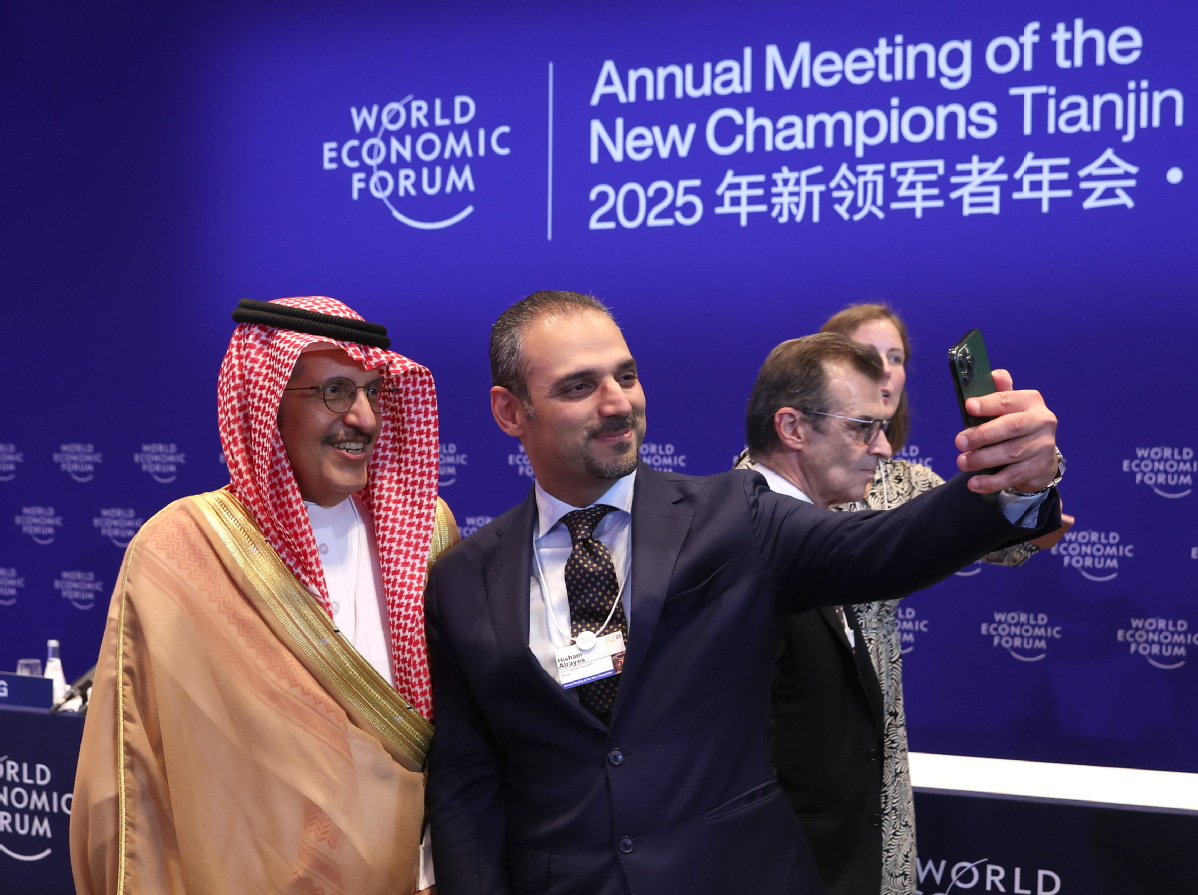
China is moving toward becoming a high-income country as a whole, as the demand for consumption upgrade is robust in the world's second-largest consumption market, he said.
The country is striving to develop itself into a mega-sized consumption powerhouse on top of being a manufacturing powerhouse, which, the premier said, will create vast new market opportunities for businesses around the world.
Noting that China's tech innovation has an open-source feature, the premier said the country is willing to share its original technologies and innovative scenarios with the world.
He reiterated the country's commitment to fostering a first-class, market-oriented business environment governed by a sound legal framework, saying it always keeps its doors wide open and warmly welcomes businesses from all countries to invest in China and grow with China.
Featuring the theme "Entrepreneurship for a New Era", the event, held from Tuesday to Thursday, has gathered over 1,700 leading figures from more than 90 countries and regions to explore how entrepreneurship and emerging technologies can unlock more dynamic and resilient economies.
While chairing the event, World Economic Forum President Borge Brende called for international cooperation to address global challenges, and expressed an optimistic outlook on China's economic prospects.
Brende said that the challenges the world faces today — from the development of artificial intelligence to supply chain stability, and from green transition to the skills for the future — require countries to "move from competition to cooperation, from fragmentation to collaboration".
"China has long been a vital partner in this regard. Its entrepreneurial ecosystem, particularly in areas like artificial intelligence, the digital economy, advanced manufacturing, green innovation and others, continues to be a powerful driver of global growth," he said.
On Wednesday afternoon, Li held a symposium with representatives of the global business community attending the Summer Davos in Tianjin.
Li assured the business executives that China is committed to providing a stable development environment and a predictable policy environment for enterprises, and encouraged foreign companies to develop technological cooperation and collaborative innovation in China.
Speaking at the meeting, Dave West, president for the Asia-Pacific, Japan and Greater China of Cisco, a worldwide technology leader in the United States, expressed his confidence about development prospects in China and his hope for a stable relationship between the US and China.
"We are confident that the Chinese market will continue to create significant and exciting opportunities as the country advances toward its high-quality development goals," West said. "I believe the global economy will be stronger with the US and China working together. And the stable US-China relations will bring mutual benefit, not just to our two countries."
Michael Gelchie, CEO of Louis Dreyfus Co, a leading merchant and processor of agricultural goods from the Netherlands, said that his company continues to be bullish about the Chinese market and looks forward to injecting fresh growth momentum into global agricultural trade.
"Amid the complex challenges facing the world, China's role as a stabilizing force is more critical than ever," he said.
TIANJIN -- Chinese Premier Li Qiang attended a symposium at the 16th Annual Meeting of the New Champions, also known as Summer Davos, in north China's Tianjin Municipality, exchanging ideas with business entrepreneurs.
After hearing the remarks from representatives, Li noted that the current international landscape is in the midst of profound and complex changes, posing significant challenges to global economic development.
Some 160 business representatives from more than 30 countries and regions attended the symposium.
The Chinese economy maintained stable growth, relying not only on a solid foundation of stability and improvement, and proactive and effective macro policies, but also on the effective utilization of market forces and the resources of enterprises, including substantial contributions from foreign-funded enterprises, the premier said.
At the same time, China offers a vast stage for the development of foreign-funded enterprises, Li noted.
Li said that in the face of a world of change and disorder, it is essential to adapt to the changing times and to respond proactively and effectively to various challenges and risks, creating a conducive environment for business development.
In the context of in-depth restructuring in the global industrial chain, the quality and efficiency of industrial supply structure are particularly important, Li noted, adding that China has strong industrial support capabilities, with its industrial and supply chains optimizing continuously.
While highlighting the importance of the speed of application of new technologies and the capability for technological upgrades, Li noted that China has a vast user base for various products and services, facilitating efficient interaction between technological innovation and industrial innovation.
There is substantial space and significant opportunities for companies from around the world to engage in scientific and technological cooperation and collaborative innovation in China, Li added.
Noting that the stability of the business development environment is vital, Li said that Chinese economy demonstrates a stability that can withstand external shocks and maintain its own pace, and the stability is further reflected in China's unwavering commitment to opening up to the outside world, enabling multinational enterprises to achieve greater success and better development in China.
Li expressed his expectation that enterprises from various countries will provide more quality products and services to the Chinese market, and strengthen technological and industrial cooperation with Chinese companies, better aligning supply and demand for mutual benefits and shared progress in technological advancement and industrial competitiveness.
China will continue to welcome foreign enterprises to invest in the country, the premier said.
Representatives at the symposium said that they remained confident in China's economic prospects, opening up and cooperation, and they would increase investment in technological innovation, and ensure smooth running of industrial and supply chains, thereby achieving greater development while integrating into China's high-quality development process.
The Belt and Road Initiative has evolved from a visionary concept into concrete results over the past decade, delivering substantial achievements in connectivity, economic growth, and global development, according to the country's top economic regulator.
Zhou Haibing, deputy head of the National Development and Reform Commission, said the BRI has "transformed from a vision into reality, from a concept into action, yielding solid and weighty achievements." He highlighted the initiative's four key contributions; advancing global connectivity, energizing economic growth, improving people's livelihoods and offering a new platform for international cooperation.?
Zhou said the BRI has "explored new paths for global connectivity," citing key infrastructure projects that have reshaped regional transport networks.
"The China-Laos Railway has been operating safely for more than three years, with total freight volume exceeding 60 million metric tons," he told a forum on Tuesday in Tianjin during the 16th Annual Meeting of the New Champions, also known as the Summer Davos. "It has helped Laos transform from a 'landlocked' country into a 'land-linked' one".?
Zhou noted that the China-Europe Railway Express has opened a new land transport corridor between Asia and Europe. "Total number of China-Europe freight train trips hit around 110,000, reaching 229 cities across 26 European countries".?
According to Zhou, the initiative continues to support the development of an open world economy and promote the liberalization and facilitation of trade and investment.
"By continuously expanding openness, the BRI drives economic globalization toward a more open, inclusive, balanced and win-win direction," he said.
According to a World Bank report, the BRI will lead to a 4.1 percent increase in trade among participating countries. "By 2030, the BRI will generate annual global benefits of $1.6 trillion," Zhou said, quoting the report.?
Another focus of the BRI is improving living standards across partner countries, Zhou said.
"The BRI inherits and promotes the Silk Road spirit, advancing a large number of small yet impactful livelihood projects aimed at poverty alleviation, employment generation, and better living conditions," he noted.?
Zhou emphasized that the BRI serves as "a new platform for international economic cooperation," underpinned by the principles of extensive consultation, joint contribution, and shared benefits.
"It embodies a global governance philosophy of consultation and cooperation, and promotes the global governance system toward a fairer and more reasonable direction," he said.?
According to the forum's session brief, over the past decade since the launch of the BRI, China has established partnerships with more than 150 countries and over 30 international organizations. Two-way investment between China and participating countries has surpassed $380 billion in total.
TIANJIN - Chinese Premier Li Qiang said on Wednesday that the international economic and trade landscape is undergoing a profound change.
Li made the remarks when addressing the opening plenary of the 16th Annual Meeting of the New Champions, also known as the Summer Davos, in North China's Tianjin municipality.
The global economic and trade system is becoming increasingly diverse, with the Global South rising rapidly, Li said, noting that while the growth of traditional trade is slowing down, emerging trade has grown against the odds.
Apart from impact on global institutions and multiplying regional collaborations, the world is also experiencing volatile declines of cross-border investment and growing risks of fragmented production and supply chains, Li added.
TIANJIN - Chinese Premier Li Qiang delivered a keynote speech at the opening plenary of the 16th Annual Meeting of the New Champions, also known as the Summer Davos, in North China's Tianjin municipality on Wednesday.
Featuring the theme "Entrepreneurship for a New Era," the event, held from June 24 to 26, is gathering over 1,700 leading figures from more than 90 countries and regions to explore how entrepreneurship and emerging technologies can unlock more dynamic and resilient economies.
TIANJIN - Chinese Premier Li Qiang on Wednesday called on the international community to take constructive actions in international economic and trade cooperation.
Li made the remarks when addressing the opening of the 16th Annual Meeting of the New Champions, also known as the Summer Davos, in North China's Tianjin municipality.
"Constructive actions mean we need to proactively take more practical measures to safeguard free trade and multilateralism and promote the stable development of the world economy," Li said.
The premier called for resolving disputes and differences through equal consultations.
Noting that it is normal for disputes and differences to arise in economic and trade exchanges among countries, the premier said that as long as countries engage in dialogue and consultation based on mutual respect, solutions can always be found.
The premier also stressed efforts to safeguard the common interests through mutually beneficial cooperation.
Faced with global challenges, the premier said it is important to strengthen macro policy coordination among countries to ensure the stability of the global industrial and supply chains. He urged closer cooperation among all countries to strengthen the security and resilience of their development.
Li further said that China will continue to deepen its integration and connectivity with the world market and strengthen industrial collaboration with various countries.
TIANJIN - Chinese Premier Li Qiang said on Wednesday that China is willing to do whatever it takes to help tackle the difficulties and challenges facing the global economy.
Li made the remarks when addressing the opening plenary of the 16th Annual Meeting of the New Champions, also known as the Summer Davos, in North China's Tianjin municipality.
TIANJIN - Chinese Premier Li Qiang said on Wednesday that China is moving towards becoming a high-income country as a whole as the demand for consumption upgrade is robust in the world's second-largest consumption market.
Li made the remarks when addressing the opening of the 16th Annual Meeting of the New Champions, also known as the Summer Davos, in North China's Tianjin municipality.
TIANJIN - China is striving to develop itself into a super-sized consumption powerhouse on the solid foundation of a manufacturing powerhouse, Chinese Premier Li Qiang said Wednesday.
Li made the remarks when addressing the opening plenary of the 16th Annual Meeting of the New Champions, also known as the Summer Davos, in North China's Tianjin municipality.
TIANJIN - China is willing to share its original technologies and innovative scenarios with the world, Chinese Premier Li Qiang said Wednesday.
Li made the remarks when addressing the opening plenary of the 16th Annual Meeting of the New Champions, also known as the Summer Davos, in North China's Tianjin municipality.
TIANJIN - China is confident in and capable of maintaining rapid economic growth, Chinese Premier Li Qiang said Wednesday.
Li made the remarks when addressing the opening of the 16th Annual Meeting of the New Champions, also known as the Summer Davos, in North China's Tianjin municipality.
"Over the years, no matter how the international environment has changed, China's economy has consistently maintained a good momentum," Li said.
He noted that China's gross domestic product grew by 5.4 percent in the first quarter of 2025 despite facing significantly heightened external shocks this year. "Key economic indicators continued to improve in the second quarter, and I noticed that international institutions have recently raised their expectations for China's economic growth," he said.
"China's economic development is not about short-term spurts, but sustained progress toward long-term goals," Li added.
He also noted that China is moving toward becoming a high-income country as a whole, driven by strong demand for consumption upgrades in the world's second-largest consumer and import market.
China is striving to develop itself into a super-sized consumption powerhouse on the solid foundation of a manufacturing powerhouse, the Chinese premier said.
Li noted that China's sustained breakthroughs and advances in innovation will inject fresh vitality into global development, helping overcome sluggish economic growth worldwide.
During the ongoing Summer Davos, World Economic Forum President Borge Brende shared an optimistic outlook on China's economic prospects.
"I'm relatively optimistic for the Chinese economy, both in the medium-term and long-term. China has diversified already, but also, China is pivoting from manufacturing of goods to more services and digital trade. We are also seeing a lot of new technologies being applied. China is doing very well on artificial intelligence, on robotics," he said.
Former British Prime Minister Tony Blair also highlighted China's remarkable story of transformation in recent decades, calling on countries to understand and stay engaged with China, rather than isolate it.
As China continues to grow stronger in the coming decades, Blair emphasized the importance of deepening engagement, with a particular focus on people-to-people exchanges in addition to government and business cooperation.
Themed "Entrepreneurship for a New Era," the event, held from June 24 to 26, has attracted over 1,700 leading figures from more than 90 countries and regions to explore how entrepreneurship and emerging technologies can unlock more dynamic and resilient economies.
TIANJIN - The Chinese government will continue to foster a first-class business environment that is market-oriented, law-based, and internationalized, and always keep the doors wide open and warmly welcome businesses from all countries to invest and deepen their roots in China, Chinese Premier Li Qiang said Wednesday.
Li made the remarks when addressing the opening plenary of the 16th Annual Meeting of the New Champions, also known as the Summer Davos, in North China's Tianjin municipality.
